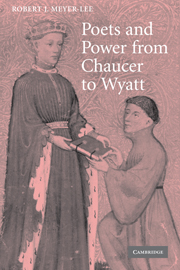PART II - THE FIRST LANCASTRIAN POETS
Published online by Cambridge University Press: 27 October 2009
Summary
Although the only place in which Chaucer explicitly mentions the notion of the poet laureate is in the prologue of the Clerk's Tale, ideas associated with this notion hover in the background in many of his other works, and no more so than in that text singularly devoted to poetry and poets, the House of Fame. Not coincidentally, this work also contains the sole moment in Chaucer's oeuvre in which the poet unambiguously textualizes not just his person but also his extraliterary social identity. This occurs in Book 2 through the voice of the Eagle, who is explaining to “Geffrey” that Jupiter has granted him a visit to the House of Fame because, among other reasons, he works too hard to hear “tydynges/Of Loves folk” (644–45) in a more ordinary fashion:
For when thy labour doon al ys,
And hast mad alle thy rekenynges,
In stede of reste and newe thynges
Thou goost hom to thy hous anoon,
And, also doomb as any stoon,
Thou sittest at another book
Tyl fully daswed ys thy look[.]
(652–68)The extraliterary valence in this passage hinges on one word, “rekenynges.” Because of this word, we understand more generic ones such as “labour” and “another book” to refer to Chaucer's duties as comptroller of the wool custom, for which he was required to keep records manu sua propria. Self-references of this nature, as we will see, are one of the constitutive devices of laureate poetics.
- Type
- Chapter
- Information
- Poets and Power from Chaucer to Wyatt , pp. 43 - 48Publisher: Cambridge University PressPrint publication year: 2007



